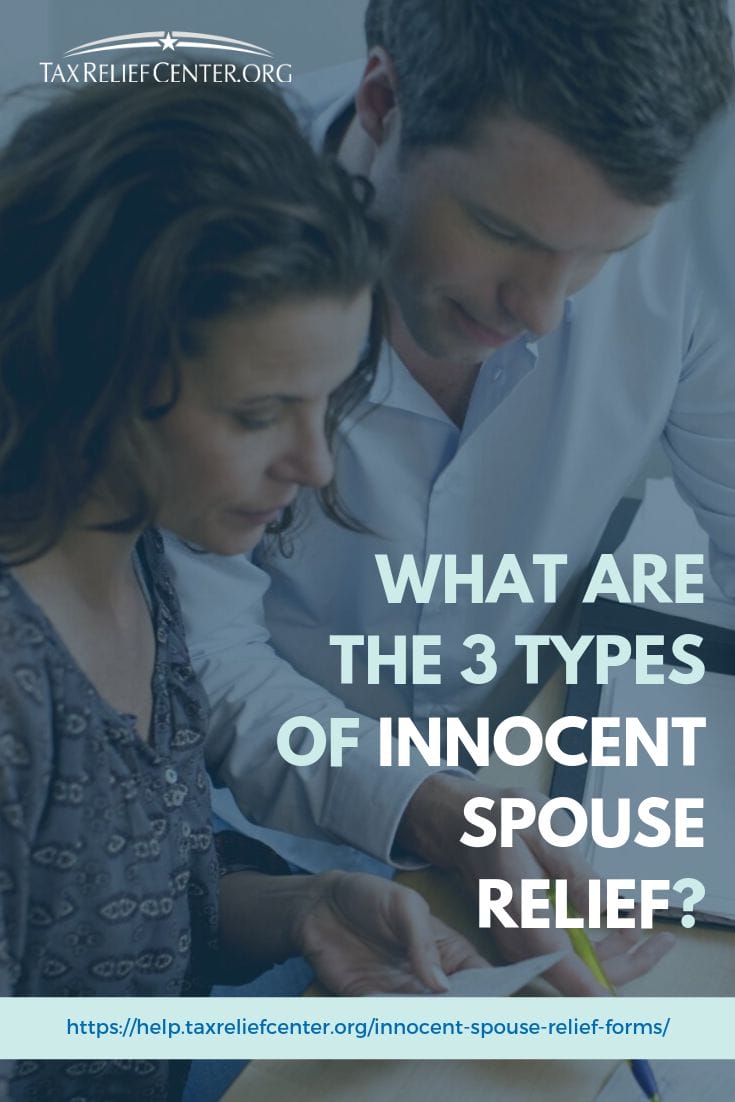Here are the things you need to know about filing for innocent spouse relief this coming tax-paying season.
RELATED: 27 Tax Worries You May Have And The Solutions For Each [FAQs]
In this article:
- What Is Innocent Spouse Relief?
- What Are the 3 Types of Innocent Spouse Relief?
- Who Qualifies for Innocent Spouse Relief?
- How Do I File for the IRS Innocent Spouse Relief?
- What Do I Need to Remember When Filing for the Innocent Spouse Relief?
- When Do I File for IRS Innocent Spouse Relief?
- What Are the Exceptions for Filing Equitable Relief?
- How Long Does the Application Process Take?
- What’s the Difference Between an Injured Spouse vs Innocent Spouse?
Common Questions About Filing for Innocent Spouse Relief
What Is Innocent Spouse Relief?
The IRS Publication 971 or innocent spouse relief may provide tax liability relief to a spouse or former spouses who file their tax returns under a joint status. Partners who file joint tax returns are equally responsible for their tax liability.
In the case of separation, the IRS continues to hold both parties accountable. However, the innocent spouse relief may relieve you from tax liability if your spouse, or former spouse, failed to report income, filed inaccurate income, or claimed improper credits or refunds.
The IRS collects any tax, penalty, and interest qualified for relief from your spouse. Keep in mind that you are both still responsible for any dues that do not qualify for relief.
What Are the 3 Types of Innocent Spouse Relief?
There are three types of innocent spouse relief you can look into depending on your qualifications.
- Traditional or Classic Innocent Spouse Relief: If you have nothing to do with your spouses’ undeclared taxes or inaccurate reports, you can file for this. Doing so will indicate that your partner has sole responsibility for whatever penalty, interest, or consequences of any erroneous declarations in your joint tax return.
- Separation of Liability Release: Couples who have legally separated, divorced, or have been estranged for at least a year may request for equal sharing of liabilities for any due penalties, interests, and unpaid taxes. If granted, the IRS will charge you with the penalty you are responsible for.
- Equitable Relief: The IRS may grant you Equitable Relief if you do not qualify for the previous two types of innocent spouse relief. You can file this type for both understated and unpaid taxes.
Who Qualifies for Innocent Spouse Relief?
Not everyone can file for Form 8857. Here are the guidelines you need to meet if you’re planning on filing for innocent spouse relief:
- Your spouse, or former spouse, listed erroneous information which caused you to file an understatement of your tax due. Erroneous items include income or incorrect deduction, basis, or credit.
- It’s proven that you were unaware of the tax understatement your spouse filed at the time you signed the joint return. The IRS will acknowledge that you were aware of the understatement if they prove you’re lying, or if a reasonable person in your situation would have understood the understatement.
- The IRS will consider your situation to determine if it’s unfair to hold you responsible for the declared tax understatement. If your spouse or former spouse abused, divorced, or deserted you, then the IRS may deem it unfair to hold you liable. Also, if you did not benefit from the tax understatement, they may acknowledge your lack of awareness of the situation and spare you from liability.
- You and your former spouse must have never transferred a piece of property for the purpose of pushing through with a fraudulent scheme. This includes plotting to defraud the IRS or any third party, including other former spouses, creditors, financial institutions, or business partners.
How Do I File for the IRS Innocent Spouse Relief?
If you want to request this type of tax relief, you need to file the Innocent Spouse Relief Form 8857. Bear in mind that you only need to submit one form per application. In fact, one approved innocent spouse form can last several years.
To make the approval process easier, you can opt to submit your IRS innocent spouse form along with a simple letter of intent. You can include any information you want the IRS to consider while reviewing your application form.
Feel free to look up any innocent spouse relief letter example online and model your own message according to it. Make sure to follow every innocent spouse rule the IRS has and to state only the facts.
If the IRS determines you’re lying, it may spell even more trouble for you. Do not stretch or bend the truth to make it favorable for you.
What Do I Need to Remember When Filing for the Innocent Spouse Relief?
If you do receive a return for possible under-declared or unpaid taxes, here are some things you should consider before filing your petition:
- Make sure you’re petitioning for a tax return you filed jointly with your spouse or ex-spouse.
- Compile files and evidence to help you present your petition clearly to the IRS. Aside from financial and work situation, you may also include your physical and mental health status, evidence of spousal abuse, and proof of tax compliance in the past.
- Read and check the Return file for possible errors. If you do find something questionable in the forms sent to you, calmly request the IRS to clarify these details.
When Do I File for IRS Innocent Spouse Relief?
You can submit Form 8857 any time you feel your spouse or former spouse should solely cover tax liability. You can opt to request the IRS for innocent spouse relief when:
- The IRS proposes to increase your tax liability after reviewing your tax return.
- The IRS sends you a notice regarding tax liability.
Although it’s best to submit innocent spouse relief form around two years after the IRS first collects your tax form 1998 – please see the exceptions for filing equitable relief below.
Also, do not delay your request if the sole reason is your lack of proper legal documents. The IRS can help you identify what paperwork you need to fulfill.
RELATED: How To Fix Tax Payment and Tax Return Errors
What Are the Exceptions for Filing Equitable Relief?
The exact date when you should file Form 8857 primarily depends on whether you’re seeking relief from a balance due, credit or refund, or even both. Here’s what you need to know about the three:
- Balance Due: The IRS generally has a decade from the date of tax liability to collect your dues. If you’re seeking relief from this type of balance due, then you should file for innocent spouse relief within the 10-year time frame. However, there will be cases where the IRS temporarily suspends this decade-long tax liability-collection period.
- Credit or Refund: If you’re requesting for either credit or refund, then you need to file Form 8857 either (a) three years after you filed the tax return or (b) two years after you pay the tax amount. However, the IRS may grant you more time if you live in a disaster-prone area or are physically/mentally unfit to manage marital affairs such as these. Make sure to include this information when you file as an innocent spouse to the IRS.
- Both: If you’re requesting both types of relief from a balance due and a credit/refund, then you have to follow two deadlines. For the balance due, the collection will apply to any of your unpaid tax liabilities. On the other hand, a credit/refund will cover any tax payments you made.
How Long Does the Application Process Take?
It usually takes around six months before the IRS reaches a verdict. During that estimated six-month-long time frame, the IRS will contact both you and the non-requesting party and ask for certain information pertaining to your request.
The IRS will contact the non-requesting party regardless if you were or were not the victim of domestic abuse and similar cases. However, they will keep your information confidential. They will only give out the necessary information to maintain and respect your privacy.
What’s the Difference Between an Injured Spouse vs Innocent Spouse?
Many taxpayers confuse the two. Generally, you file for innocent spouse relief once you become aware of any tax understatement your spouse or former spouse filed. This is often limited to separated couples.
On the other hand, filing for an injured spouse generally applies to married individuals. This means you want to separate your spouse’s tax liability from your own.
For example, a newlywed bride soon discovers that her husband has a large amount of outstanding debt. As a result, her tax refunds are offset, and she gets nothing. If she qualifies as an injured spouse, the bride may get her share of the refund.
Important to note: Despite its name, an injured spouse does not involve physical abuse. It’s about separating your dues from your spouse’s dues.
If you suddenly become aware of any tax understatement, then it’s best to file for innocent spouse relief as soon as possible. The longer you delay it, the bigger your tax troubles will be.
Don’t be afraid to consider filing the form even if you lack certain information. The IRS will help you get through it with ease, as long as you’re transparent and truthful.
What are your questions on filing for innocent spouse relief? Post them in the comments section down below!
If you owe back taxes, visit taxreliefcenter.org for more information on tax relief options.
Up Next:
- Tax Relief For Deserving Americans | Do You Qualify?
- 2019 Tax Refund Schedule: How Long Does It Take To Get A Tax Refund | Tax Help Solutions
- Top 8 Reasons To Appeal An IRS Tax Lien And How To Do It
Editor’s Note: This post was originally submitted on December 19, 2018, and has been updated for quality and relevancy.




